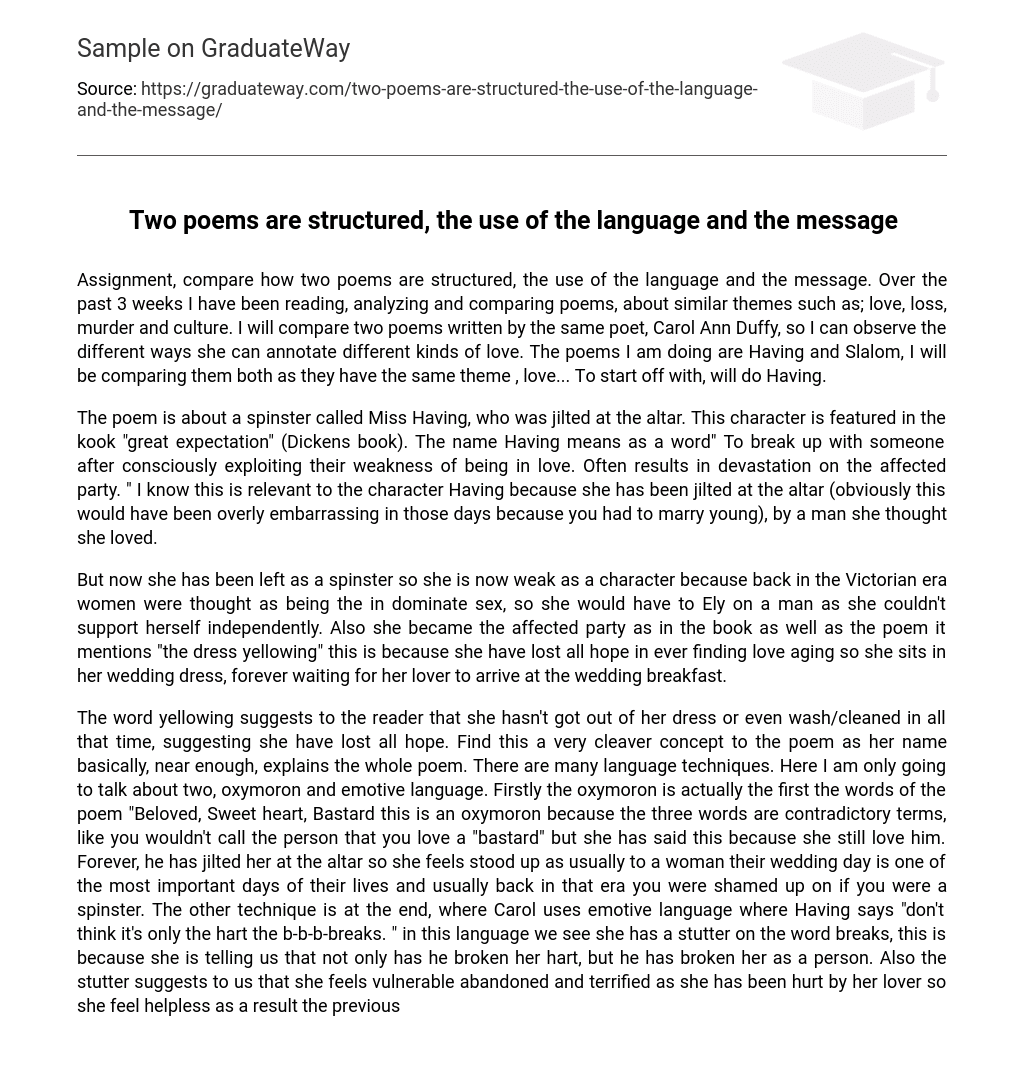Assignment, compare how two poems are structured, the use of the language and the message. Over the past 3 weeks I have been reading, analyzing and comparing poems, about similar themes such as; love, loss, murder and culture. I will compare two poems written by the same poet, Carol Ann Duffy, so I can observe the different ways she can annotate different kinds of love. The poems I am doing are Having and Slalom, I will be comparing them both as they have the same theme , love… To start off with, will do Having.
The poem is about a spinster called Miss Having, who was jilted at the altar. This character is featured in the kook “great expectation” (Dickens book). The name Having means as a word” To break up with someone after consciously exploiting their weakness of being in love. Often results in devastation on the affected party. ” I know this is relevant to the character Having because she has been jilted at the altar (obviously this would have been overly embarrassing in those days because you had to marry young), by a man she thought she loved.
But now she has been left as a spinster so she is now weak as a character because back in the Victorian era women were thought as being the in dominate sex, so she would have to Ely on a man as she couldn’t support herself independently. Also she became the affected party as in the book as well as the poem it mentions “the dress yellowing” this is because she have lost all hope in ever finding love aging so she sits in her wedding dress, forever waiting for her lover to arrive at the wedding breakfast.
The word yellowing suggests to the reader that she hasn’t got out of her dress or even wash/cleaned in all that time, suggesting she have lost all hope. Find this a very cleaver concept to the poem as her name basically, near enough, explains the whole poem. There are many language techniques. Here I am only going to talk about two, oxymoron and emotive language. Firstly the oxymoron is actually the first the words of the poem “Beloved, Sweet heart, Bastard this is an oxymoron because the three words are contradictory terms, like you wouldn’t call the person that you love a “bastard” but she has said this because she still love him. Forever, he has jilted her at the altar so she feels stood up as usually to a woman their wedding day is one of the most important days of their lives and usually back in that era you were shamed up on if you were a spinster. The other technique is at the end, where Carol uses emotive language where Having says “don’t think it’s only the hart the b-b-b-breaks. ” in this language we see she has a stutter on the word breaks, this is because she is telling us that not only has he broken her hart, but he has broken her as a person. Also the stutter suggests to us that she feels vulnerable abandoned and terrified as she has been hurt by her lover so she feel helpless as a result the previous events she has no man to rely on to comfort her so as a lonely person she will break. Make the reader feel sympathetic towards Having. The structure of the poem Having is actually quite simple. There are four stanzas, each with four lines. Each stanza has a general them of its own.
The first stanza is about the man that stood her up at the altar, the second is about her and she is spending her days without him, the third is about what she wishes life was with him (so like a dream) and the final stanza is reality. The poem also has irregular rhyme . The Second poem is Slalom In the poem it appears that Slalom has become a serial remover of heads. She tells us that she’d “done it before”. This is because Slalom is the character from he new testament where her father send her out to go and sleep with her uncle and chop off his head and bring it back to her dad.
And that she would “doubtless… Do it again”. Having woken up with a severed head on the pillow, she cannot even remember the owner’s name. So she calls for the maid has breakfast, and decides to “clean up” her life. As part of this regime, she decides to get rid of her lover – and the poem ends as she pulls back the sheets “sticky” with blood, to find “his head on a platter. (Both Matthew and Mark say that John the Baptist’s head was brought to Slalom on a platter. For many generations of readers the platter was the most memorable and gruesome detail in the story. In conclusion, love the way Carol has wrote about two different aspects of love in different ways. Having, the lost a dependency and inequality of love and Slalom, the independent, freewheeling and dominate figure in the love interest. However, I loved Having and the sympathy you get for her isn’t as dramatic as Slalom because she shares an intimate and romantic moment with the men that she ends up killing giving her a slight ambiguous feel to her character, and this is the mystery I love surrounding Slalom.





